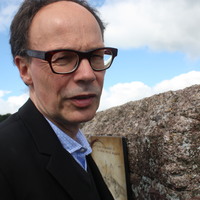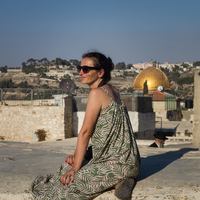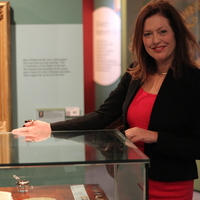
Markus Vinzent
Supervisors: Reinhard M. Hübner and Adolf Martin Ritter
less
Related Authors
Christoph Heil
University of Graz
Eftychia Stavrianopoulou
Universität Heidelberg
Ulrike Brunotte
Maastricht University, Faculty of Arts and Social Sciences
Joerg Ruepke
Universität Erfurt
Hans Rudolf Velten
University of Siegen
Kim Skjoldager-Nielsen
Stockholm University
Risto Uro
University of Helsinki
Ewa Dębicka-Borek
Jagiellonian University
Elisa Ganser
LMU
Edith Hall
King's College London
InterestsView All (34)









Uploads
Papers by Markus Vinzent
At the conference, we commemorate Elizabeth Livingstone ('Betsy' to her friends) who had served the conference and edited for many years the proceedings of the conferene.
Betsy was born in India, a 'daughter of the Raj'. After school she went up to Oxford University, to St Anne's College (then, St Anne's Society), to read History. Very soon after graduation she became secretary to Dr F. L. Cross, the Lady Margaret Professor of Divinity and Canon of Christ Church, her immediate task being to help Cross in organizing the first Oxford Patristic Conference, which took place in 1951. Betsy's part in this-as in the other conferences Cross organized, and those Betsy organized after his death-was to coordinate a complex logistical exercise: inviting participants, getting titles for their communications, arranging the plenary lectures, and facilitating accommodation for those who attended, as well as finding venues for the lectures and the multitude of communications, which ran concurrently, arranged thematically. To make it possible to move from communication to communication, Betsy introduced a system of bells, rung to prevent speakers overrunning their allotted twenty minutes. Very soon another major task became part of Betsy's remit as Cross's secretary: the coordination of the Oxford Dictionary of the Christian Church, the first edition of which appeared-to universal acclaim-in 1957. This demanded much the same organizational skills as the patristic conferences. The second edition appeared in 1974, in a much-changed theological world-after the Second Vatican Council and theological turmoils of the 60s. Canon Cross had died in 1969, and the second edition was brought to fruition by Betsy. The third edition was edited by Betsy, who was able to rely on help from her many friends in the world of theology and Church history. Betsy had become well known-and indeed revered-especially throughout the expanding world of patristic scholarship. Her key role in facilitating the Patristic Conferences and the Oxford Dictionary of the Christian Church received eventual recognition with the award of an honorary Lambeth DD, the MBE, and in 2015 the award of the President of the British Academy's Medal. She died on New Year's Day, 2023. A Requiem Mass will be said for Betsy on Thursday 8 th August at 8am in Pusey House Chapel, St Giles. All delegates are welcome to attend.
At the conference, we commemorate Elizabeth Livingstone ('Betsy' to her friends) who had served the conference and edited for many years the proceedings of the conferene.
Betsy was born in India, a 'daughter of the Raj'. After school she went up to Oxford University, to St Anne's College (then, St Anne's Society), to read History. Very soon after graduation she became secretary to Dr F. L. Cross, the Lady Margaret Professor of Divinity and Canon of Christ Church, her immediate task being to help Cross in organizing the first Oxford Patristic Conference, which took place in 1951. Betsy's part in this-as in the other conferences Cross organized, and those Betsy organized after his death-was to coordinate a complex logistical exercise: inviting participants, getting titles for their communications, arranging the plenary lectures, and facilitating accommodation for those who attended, as well as finding venues for the lectures and the multitude of communications, which ran concurrently, arranged thematically. To make it possible to move from communication to communication, Betsy introduced a system of bells, rung to prevent speakers overrunning their allotted twenty minutes. Very soon another major task became part of Betsy's remit as Cross's secretary: the coordination of the Oxford Dictionary of the Christian Church, the first edition of which appeared-to universal acclaim-in 1957. This demanded much the same organizational skills as the patristic conferences. The second edition appeared in 1974, in a much-changed theological world-after the Second Vatican Council and theological turmoils of the 60s. Canon Cross had died in 1969, and the second edition was brought to fruition by Betsy. The third edition was edited by Betsy, who was able to rely on help from her many friends in the world of theology and Church history. Betsy had become well known-and indeed revered-especially throughout the expanding world of patristic scholarship. Her key role in facilitating the Patristic Conferences and the Oxford Dictionary of the Christian Church received eventual recognition with the award of an honorary Lambeth DD, the MBE, and in 2015 the award of the President of the British Academy's Medal. She died on New Year's Day, 2023. A Requiem Mass will be said for Betsy on Thursday 8 th August at 8am in Pusey House Chapel, St Giles. All delegates are welcome to attend.
important elements of life—such as land, human beings, big cattle, and
animals—belonged to the Gods or, for the Jews, to God, and were not for sale or purchase. Despite this knowledge, all of the various cultures and peoples did, of course,trade in these beings,while,as the Roman mancipatio teaches us, making use of workaround forms of purchase agreements.This chapter analyzes how Christians developed a systematic reflection on such sales and purchases and how they moved away from the traditional reluctance in dealing with these goods. Christians, as will be shown, developed the idea that as the supreme God had only one Son, the one that was sent to Earth and killed, this sole heir of God left all that was owned by God to the Son’s co-heirs in his New Testament. As heirs of the Son, Christians felt fully entitled to sell and purchase those goods. This conceptualization was a major shift that was soon followed by Justinian in abolishing the workaround praxis of the mancipatio and allowed for a commodification of, for example, land andnature.